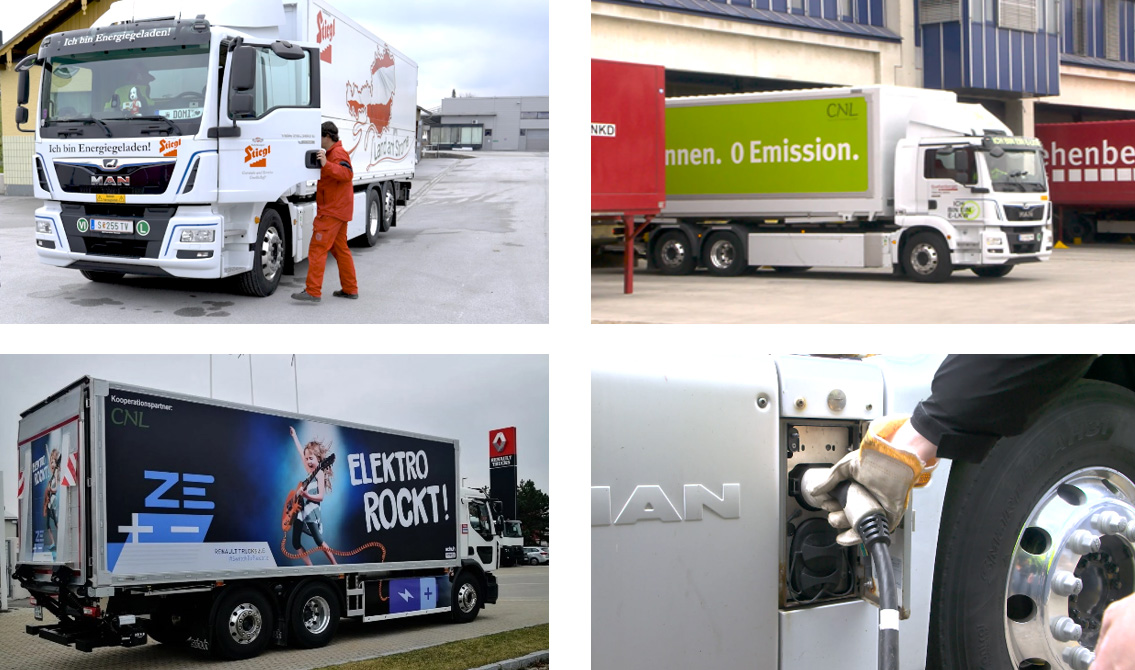IEA HEV Task 41: Electric Freight Vehicles (Working period 2021 - 2022)
Short Description
Without any CO2 reduction measures, commercial vehicles would be the world's largest source of fossil fuel consumption in road traffic in 2050. Heavy-duty vehicles are also furthest from a zero emissions path, with a 65% sales gap by 2040.
Therefore, IEA HEV Task 41 deals with the investigation of the current market and technology progress, as well as the analysis of the essential aspects for a successful market launch of electric commercial vehicles. The scope of Task 41 includes vehicles of classes N1, N2 and N3 and all types of electrified or electric powertrains.
The focus of the work in the Austrian sub-project of the international task is on the following
areas:
- Introduce Austrian pilot projects for electric commercial vehicles at international level
- Exchange identified practical barriers and solution approaches from Austrian and international pilot projects
- Evaluate the substitution potential, costs and energy consumption of electric commercial vehicles using coordinated methods and results
- Summary of effective incentive systems for the market launch of electric commercial vehicles in Austria based on their influence on user costs (TCO)
- To disseminate the results of Task 41 to target groups such as national logistics service providers, BMK and research institutions
- Basic innovation aspects of the project are the determination of the substitution potential, the optimized use and the necessary measures to promote the use of electric commercial vehicles.
The essential working approach of the international task during the project period is the exchange of information in a workshop and through contacts with other international networks. Based on the international exchange in the task, the dissemination of results should take place nationally with the Austrian representatives from politics, industry and research in the context of presentations and public workshops. A major focus is on the target group of national logistics service providers, who are to be informed about the results of the task activities through at least 3 national workshops over the project period of the Council for Sustainable Logistics (CNL) working group.
The Austrian sub-project gives users an assessment of the current and long-term substitution potential of electric commercial vehicles and can thus avoid potential "stranded investments". Policy makers will be informed on the most effective monetary and non-monetary measures to support the broad market ramp-up of commercial electric vehicles.
The main working approach of the international task during the project period was the exchange of information in a workshop and through contacts with other international networks. On this basis, results were disseminated in two national workshops with Austrian representatives from politics, industry, research and the interested public. A key focus was on the target group of national logistics service providers.
Thanks to the Austrian sub-project, logistics providers can now assess more in detail that electric trucks will be widely available in the near future and will also be economically viable compared to diesel and especially future FCEV models.
Policy makers were informed about the most effective monetary and non-monetary measures to promote the broad market ramp-up of electric commercial vehicles. Purchase subsidies for zero-emission trucks, as currently envisaged in the ENIN funding programme, as well as toll reductions with long-term planning certainty are central cornerstones for a rapid switch to zero-emission trucks, but also the future pricing of CO2 emissions and consequently the savings that can be made by avoiding them.
Project Images
Terms of use: The pictures listed underneath the header “Project Pictures” originate from the projects in the frame of the programmes City of Tomorrow, Building of Tomorrow and the IEA Research Cooperation. They may be used credited for non-commercial purposes under the Creative Commons License Attribution-NonCommercial (CC BY-NC).
Participants
- Austria
- Germany (lead)
- Switzerland
- Turkey
- United Kingdom
Contact Address
University of Natural Resources and Applied Life Sciences Vienna
Institute for Process and Energy Engineering
Peter Jordan-Straße 82
A-1190 Vienna
Werner Müller, Annette Zeinlinger, Maria Höggerl
Council for Sustainable Logistics (CNL)
Schottenfeldgasse 29
A-1070 Vienna
Tel.: +43 (1) 47654 89321
E-mail: cnl-team@boku.ac.at
Web: councilnachhaltigelogistik.at




